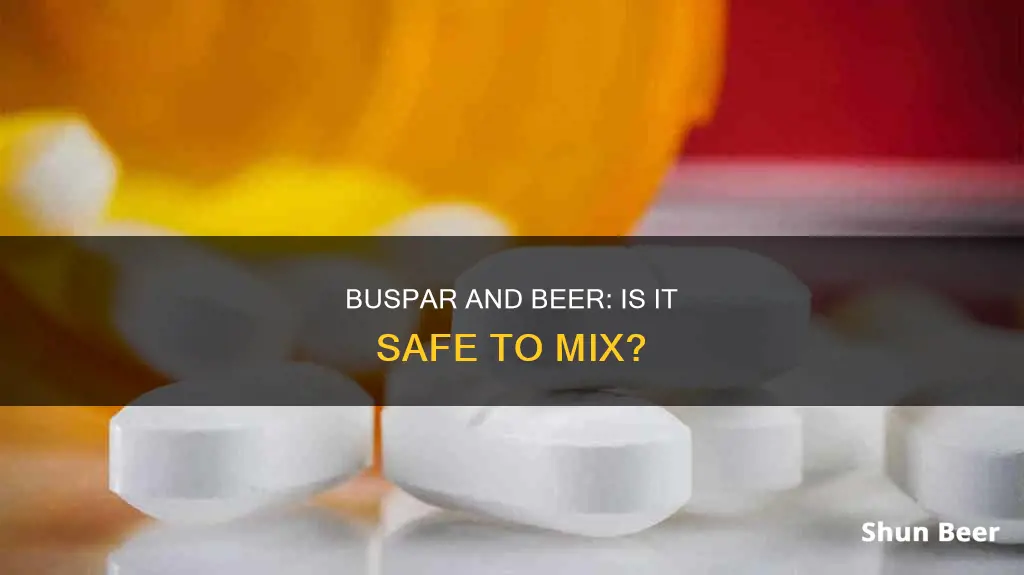
Buspar, also known as Buspirone, is a prescription medication used to treat anxiety disorders. It is relatively safe and has a low risk of physical dependence. However, mixing Buspar with alcohol can increase the drug's side effects and heighten risks such as problems concentrating, trouble breathing, impaired judgment, and upset stomach or abdominal pain. As both Buspar and alcohol can cause drowsiness and dizziness, combining the two can lead to harmful drug interactions and more severe effects on the central nervous system. Therefore, it is recommended to avoid drinking alcohol while taking Buspar to treat anxiety.
| Characteristics | Values |
|---|---|
| Should you drink beer on Buspar? | No |
| Why? | Alcohol can increase the nervous system side effects of Buspar such as dizziness, drowsiness, difficulty concentrating, impaired judgment, upset stomach, abdominal pain, difficulty breathing, slowed breathing, impaired muscle control, falls or serious injuries, especially if you are older. |
| What else should you avoid when taking Buspar? | Grapefruit juice and large amounts of grapefruits. |
What You'll Learn

Buspar and alcohol both affect the central nervous system
Buspar (buspirone) is a prescription medication used to treat anxiety, particularly generalized anxiety disorder (GAD). It is an anti-anxiety medication that works by slowing down activity in the central nervous system. It is often prescribed as a second-line treatment for patients who cannot tolerate selective serotonin reuptake inhibitors (SSRIs) and serotonin-norepinephrine reuptake inhibitors (SNRIs).
Alcohol is a sedative and a depressant that also acts on the central nervous system. It can make you feel sleepy, drowsy, and lightheaded. When used together with Buspar, alcohol can increase the severity of the drug's effects on the central nervous system. This combination can lead to harmful and potentially dangerous side effects.
Both Buspar and alcohol can cause similar side effects, including headache, nausea, dizziness, drowsiness, and difficulty concentrating. When combined, these side effects may be exacerbated, and it can become harder to understand how your body is responding to Buspar. This combination can also increase the risk of adverse effects, such as slowed breathing, impaired muscle control, and falls or injuries, especially in older individuals.
Additionally, alcohol can impair the effectiveness of Buspar in treating anxiety symptoms. As alcohol also acts on the central nervous system, it can interfere with the medication's ability to alleviate anxiety. This may lead individuals to feel that their medication is not working and subsequently take higher doses, increasing the risk of overdose and other severe reactions.
Therefore, it is strongly advised to avoid consuming alcohol while taking Buspar. The combination can lead to harmful drug interactions and adverse effects on the central nervous system. If you have anxiety and plan to consume alcohol, it is essential to consult your healthcare provider to discuss the potential risks.
Viagra and Beer: A Safe Mix?
You may want to see also

Buspar and alcohol have similar side effects
Buspar, also known as buspirone, is a prescription medication used to treat anxiety disorders, particularly generalized anxiety disorder (GAD). It is an anti-anxiety medication that works by influencing the brain's serotonin and dopamine receptors, creating a calming effect that helps to regulate mood and reduce anxiety symptoms.
While Buspar is considered relatively safe and has a low risk of physical dependence, it is not recommended to mix it with alcohol. This is because Buspar and alcohol have similar side effects on the central nervous system, including drowsiness, dizziness, and difficulty concentrating. Mixing the two can increase the severity of these side effects and lead to more serious consequences such as slowed or difficult breathing and impaired muscle control. These risks can result in falls or injuries, especially for older adults.
Additionally, alcohol can impair the effectiveness of Buspar in treating anxiety symptoms. It can also increase the risk of overdose and other severe reactions when combined with Buspar. Both substances can be addictive when abused for long periods, and mixing them is a form of substance abuse that increases the likelihood of dependence, addiction, and other long-term consequences.
Therefore, it is essential to avoid consuming alcohol while taking Buspar to prevent harmful interactions and potential health risks. If you have anxiety and plan to drink alcohol, it is advisable to consult your healthcare provider to discuss the potential risks and alternatives.
Beer and Anemia: Is It Safe to Drink?
You may want to see also

Mixing Buspar and alcohol can lead to overdose
Buspar, also known as buspirone, is a prescription medication used to treat anxiety disorders and is often prescribed when patients cannot tolerate selective serotonin reuptake inhibitors (SSRIs). While Buspar is relatively safe and accessible, it still carries several risks. One of these risks is the danger of mixing it with alcohol.
Buspar and alcohol have similar side effects, such as headache, nausea, and dizziness. When combined, these side effects can be exacerbated, and it can be harder to understand how your body is responding to Buspar. This combination can also lead to an increased risk of dependence. In addition, alcohol can impair the effectiveness of Buspar in treating anxiety symptoms. As a result, users may feel that their medication is not working and may take more doses, increasing the risk of overdose and other severe reactions.
The main danger of mixing Buspar and alcohol is central nervous system depression. Both substances slow down important functions like breathing, heart rate, and thinking, leading to severe impairment of various functions of the mind and body. Common side effects of mixing Buspar and alcohol include increased drowsiness and sedation, upset stomach and abdominal pain, difficulty breathing, impaired judgment, and trouble concentrating.
While Buspar alone has not been known to cause any overdose-related deaths, when mixed with alcohol, overdose cases occur more frequently and can be severe. Therefore, it is essential to avoid mixing Buspar and alcohol to prevent potentially harmful and even life-threatening consequences.
Beer and Blood Pressure Medicine: Safe Mix?
You may want to see also

Buspar is prescribed for alcohol withdrawal
Buspar, or buspirone, is a brand name for a drug that helps manage anxiety disorders. It is an anxiolytic or anti-anxiety medication that works by slowing down activity in the central nervous system.
Alcohol is a sedative and a depressant that also acts on the central nervous system. It can make you feel sleepy, drowsy, and lightheaded. Mixing Buspar and alcohol can increase the severity of the effects on the central nervous system, leading to slowed breathing, impaired muscle control, and a higher risk of falls or injuries, especially in older people. Therefore, drinking alcohol while taking Buspar is not recommended.
However, Buspar may be prescribed off-label to support patients during alcohol withdrawal. It can help reduce alcohol cravings and stabilize mood. A study conducted in 1989 compared Buspar with a placebo in a double-blind, 8-week trial involving 50 outpatients with mild to moderate alcohol abuse. The results suggested that Buspar reduced alcohol craving by 40%, improved patients' psychopathology, and decreased drinking behavior by 57%.
While Buspar has not been approved by the U.S. Food and Drug Administration (FDA) for treating alcohol withdrawal symptoms, it may be prescribed by healthcare providers to make the transition easier for those trying to quit alcohol dependence.
Beer Ads: What Doesn't Work and Why
You may want to see also

Grapefruit juice interacts with Buspar
A study found that grapefruit juice increased the mean peak plasma concentration of buspirone by 4.3 times, with a range of 2 to 15.6 times. The time it took to reach the peak concentration of buspirone also increased from 0.75 to 3 hours when grapefruit juice was consumed.
The U.S. Food and Drug Administration (FDA) has warned that grapefruit juice and grapefruit can affect the way some medicines work and recommends that patients receiving buspirone should preferably avoid the consumption of large amounts of grapefruits and grapefruit juice. If this is not possible, the buspirone dose should be taken at least 2 hours before or 8 hours after consuming grapefruit or grapefruit juice.
It is important to note that the interaction between grapefruit juice and buspirone seems to be most problematic when people consume large quantities of grapefruit products. Therefore, it may not be necessary to cut out grapefruit completely, but rather to consume it in moderation. Patients should consult their healthcare provider about a safe amount of grapefruit products they can consume while taking buspirone.
Beer Traps: Effective Earwig Control or Urban Myth?
You may want to see also
Frequently asked questions
#
No, it is not safe to drink beer or any other form of alcohol while taking Buspar (buspirone). Mixing the two can increase your risk of side effects such as drowsiness, dizziness, impaired judgment, and difficulty breathing.
Both Buspar and alcohol affect the central nervous system, slowing important functions like breathing, heart rate, and thinking. When combined, their effects on the nervous system are exacerbated, leading to more severe side effects.
The main danger of mixing Buspar and alcohol is central nervous system depression, which can lead to severe impairment of various functions of the mind and body. This combination can also increase the risk of overdose and other serious adverse reactions.
There is no specific timeframe considered absolutely safe to drink alcohol after stopping Buspar. The half-life of Buspar is around six hours, but factors like age, kidney or liver problems, and other medications can slow the time it takes for your body to clear the medication. It is best to consult your healthcare provider for a safe timeline.
Common side effects of Buspar include drowsiness, dizziness, mild nasal congestion, upset stomach, abdominal pain, impaired concentration, muscle pain, muscle spasms, and changes in blood pressure. In rare cases, it can also cause uncontrollable body movements and worsen anxiety symptoms.







